2015 年 6 月英语六级真题(第 1 套)
Writing
Part I
Directions:Forthispart, youareallowed30minutestowriteanessaycommenting
onthesaying“Knowledgeisatreasure,butpracticeisthekeytoit.”
Youcangiveanexampleortwotoillustrateyourpointofview.Youshould
write at least 150 words but no more than 200 words.
(30 minutes)
(30 minutes)
Listening Comprehension
Part II
Section A
Directions:In this section, you will hear 8 short conversations and 2 long
conversations.Attheendofeachconversation,oneormorequestionswill
beaskedaboutwhatwassaid.Boththeconversationandthequestionswill
be spoken only once. After each question there will be a pause. During
thepause,youmustreadthefourchoicesmarkedA),B),C),andD),and
decide which is the best answer. Then mark the corresponding letter on
Answer Sheet 1 with a single line through the centre.
1. A) Prepare for his exams.
B) Catch up on his work.
C) Attend the concert.
D) Go on a vacation.
2. A) Three crew members were involved in the incident.
B) None of the hijackers carried any deadly weapons.
C) The plane had been scheduled to fly to Japan.
D) None of the passengers were injured or killed.
3. A) An article about the election.
B) A tedious job to be done.
C) An election campaign.
D) A fascinating topic.
4. A) The restaurant was not up to the speakers’ expectations.
B) The restaurant places many ads in popular magazines.
C) The critic thought highly of the Chinese restaurant.
D) Chinatown has got the best restaurants in the city.
5. A) He is going to visit his mother in the hospital.
B) He is going to take on a new job next week.
C) He has many things to deal with right now.
D) He behaves in a way nobody understands.
6. A) A large number of students refused to vote last night.
B) At least twenty students are needed to vote on an issue.
C) Major campus issues had to be discussed at the meeting.
D) More students have to appear to make their voice heard.
7. A) The woman can hardly tell what she likes.
B) The speakers like watching TV very much.
�
C) The speakers have nothing to do but watch TV.
D) The man seldom watched TV before retirement.
8. A) The woman should have registered earlier.
B) He will help the woman solve the problem.
C) He finds it hard to agree with what the woman says.
D) The woman will be able to attend the classes she wants.
Questions 9 to 12 are based on the conversation you have just heard.
9. A) Persuade the man to join her company.
B) Employ the most up-to-date technology.
C) Export bikes to foreign markets.
D) Expand their domestic business.
10. A) The state subsidizes small and medium enterprises.
B) The government has control over bicycle imports.
C) They can compete with the best domestic manufacturers.
D) They have a cost advantage and can charge higher prices.
11. A) Extra costs might eat up their profits abroad.
B) More workers will be needed to do packaging.
C) They might lose to foreign bike manufacturers.
D) It is very difficult to find suitable local agents.
12. A) Report to the management.
B) Attract foreign investments.
C) Conduct a feasibility study.
D) Consult financial experts.
Questions 13 to 15 are based on the conversation you have just heard.
13. A) Coal burnt daily for the comfort of our homes.
B) Anything that can be used to produce power.
C) Fuel refined from oil extracted from underground.
D) Electricity that keeps all kinds of machines running.
14. A) Oil will soon be replaced by alternative energy sources.
B) Oil reserves in the world will be exhausted in a decade.
C) Oil consumption has given rise to many global problems.
D) Oil production will begin to decline worldwide by 2025.
15. A) Minimize the use of fossil fuels.
B)Start developing alternative fuels.
C) Find the real cause for global warming.
D) Take steps to reduce the greenhouse effect.
Section B
Directions: In this section, you will hear 3 short passages. At the end of each
passage,youwillhearsomequestions.Boththepassageandthequestions
willbespoken onlyonce.After youhear aquestion, youmustchoose the
best answer from the four choices marked A), B), C), and D). Then mark
�
thecorrespondingletteronAnswerSheet1withasinglelinethroughthe
centre.
Passage One
Questions 16 to 18 are based on the conversation you have just heard.
16. A) The ability to predict fashion trends.
B) A refined taste for artistic works.
C) Years of practical experience.
D) Strict professional training.
17. A) Promoting all kinds of American hand-made specialties.
B) Strengthening cooperation with foreign governments.
C) Conducting trade in art works with dealers overseas.
D) Purchasing handicrafts from all over the world.
18. A) She has access to fashionable things.
B) She is doing what she enjoys doing.
C) She can enjoy life on a modest salary.
D) She is free to do whatever she wants.
Passage Two
Questions 19 to 22 are based on the passage you have just heard.
19. A) Join in neighborhood patrols.
B) Get involved in his community.
C) Voice his complaints to the city council.
D) Make suggestions to the local authorities.
20. A) Deterioration in the quality of life.
B) Increase of police patrols at night.
C) Renovation of the vacant buildings.
D) Violation of community regulations.
21. A) They may take a long time to solve.
B) They need assistance from the city.
C) They have to be dealt with one by one.
D) They are too big for individual efforts.
22. A) He had got some groceries at a big discount.
B) He had read a funny poster near his seat.
C) He had done a small deed of kindness.
D) He had caught the bus just in time.
Passage Three
Questions 23 to 25 are based on the passage you have just heard.
23. A) Childhood and healthy growth.
B) Pressure and heart disease.
C) Family life and health.
D) Stress and depression.
24. A) It experienced a series of misfortunes.
B) It was in the process of reorganization.
�
C) His mother died of a sudden heart attack.
D) His wife left him because of his bad temper.
25. A) They would give him a triple bypass surgery.
B) They could remove the block in his artery.
C) They could do nothing to help him.
D) They would try hard to save his life.
Section C
Directions: Inthissection,youwillhearapassagethreetimes.Whenthepassage
is read for the first time,you should listen carefully for its general
idea. When the passage is read for the second time, you arerequired to
fillintheblankswiththeexactwordsyouhavejustheard.Finally,when
the passage is read forthe third time, you should check what you have
written.
When most people think of the word “education”, they think of a pupil as a
26 stuff
sort of animate sausage casing. Into this empty casing, the teachers
“education”.
But genuine education, as Socrates knew more than two thousand years ago, is
27the stuffings of information into a person, but rather eliciting knowledge
not
from him; it is the
28of what is in the mind.
“The most important part of education,” once wrote William Ernest Hocking,
29Harvard philosopher, “is this instruction of a man in what he has inside
the
of him”. And, as Edith Hamilton has reminded us, Socrates never said, “I know,
learn from me.” He said, rather, “Look into your own selves and find the 30of truth
that God has put into every heart, and that only you can kindle (点燃) to a 31.”
In a dialogue, Socrates takes an ignorant slave boy, without a day of 32, and
proves to the amazed observers that the boy really “knows” geometry—because the
principles of geometry are already in his mind, waiting to be called out.
So many of the discussions and 33about the content of education are useless and
inconclusive because they 34what should “go into” the student rather than with
what should be taken out, and how this can best be done.
The college student who once said to me, after a lecture, “I spend so much time
studying that I don’t have a chance to learn anything,” was clearly expressing
his 35with the sausage-casing view of education.
Reading
(40 minutes)
Comprehension
Part III
Section A
Directions: In this section, there isa passagewithten blanks.Youarerequired
toselectonewordforeachblankfromalistofchoicesgiveninaword
bank following the passage. Read the passage through care fully before
making yourchoices.Eachchoice inthebank isidentified bya letter.
PleasemarkthecorrespondingletterforeachitemonAnswerSheet2with
asinglelinethroughthecentre.Youmaynotuseanyofthewordsinthe
�
bank more than once.
Questions 36 to 45 are based on the following passage.
“That which does not kill us makes us stronger.” But parents can’t handle
it when teenagers put this36into practice. Now technology has become the new field
for the age-old battle between adults and their freedom-seeking kids.
Locked indoors, unable to get on their bicycles and hang out with their friends,
teens have turned to social media and their mobile phones to socialize with their
peers. What they do online often37what they might otherwise do if their mobility
weren’t so heavily38in the age of helicopter parenting. Social media and
smart-phone apps have become so popular in recent years because teens need a place
to call their own. They want the freedom to39their identity and the world around
them.Instead of40out, they jump online.
As teens have moved online, parents have projected their fears onto the Internet,
imagining all the41dangers that youth might face—from42strangers to cruel peers
to pictures or words that could haunt them on Google for the rest of their lives.
Rather than helping teens develop strategies for negotiating public life and
the risks of43with others, fearful parents have focused on tracking, monitoring and
blocking. These tactics (策略) don’t help teens develop the skills they need to
manage complex social situations,44risks and get helpwhen they’re in trouble.
“Protecting” kids may feel like the right thing to do, but it45the learning that
teens need to do as they come of age in a technology-soaked world.
A) assess
B) constrained
C) contains
D) explore
E) influence
F) interacting
G) interpretation
H) magnified
I) mirrors
J) philosophy
K) potential
L) sneaking
M) sticking
N) undermines
O) violent
Section B
Directions:In this section, you are going to read a passage with ten statements
attached to it. Eachstatement contains information given in one of the
paragraphs.Identifytheparagraphfromwhichtheinformationisderived.
Youmaychooseaparagraphmorethanonce.Eachparagraphismarkedwith
a letter. Answer the questions by marking the corresponding letter on
Answer Sheet 2.
Inequality Is Not Inevitable
[A] A dangerous trend has developed over this past third of a century. A country
that experienced shared growth after World War II began to tear apart, so much so
that when the Great Recession hit in late 2007, one could no longer ignore the
division that had come to define the American economic landscape. How did this
�
“shining city on a hill” become the advanced country with the greatest level of
inequality?
[B] Over the past year and a half, TheGreatDivide, a series in TheNewYorkTimes,
has presented a wide range of examples that undermine the notion that there are any
truly fundamental laws of capitalism. The dynamics of the imperial capitalism of
the 19th century needn’t apply in the democracies of the 21st. We don’t need to have
this much inequality in America.
[C] Our current brand of capitalism is a fake capitalism. For proof of this go back
to our response to the Great Recession, where we socialized losses, even as we
privatized gains. Perfect competition should drive profits to zero, at least
theoretically, but we have monopolies making persistently high profits. C.E.O.s
enjoy incomes that are on average 295 times that of the typical worker, amuch higher
ratio than in the past, without any evidence of a proportionate increase in
productivity.
[D] If it is not the cruel laws of economics that have led to America’s great divide,
what is it? The straightforward answer, our policies and our politics. People get
tired of hearing about Scandinavian success stories, but the fact of the matter is
that Sweden, Finland and Norway have all succeeded in having about as much or faster
growth in percapita (人均的) incomes than the United States and with far greater
equality.
[E] So why has America chosen these inequality-enhancing policies? Part of the answer
is that as World War II faded into memory, so too did the solidarity it had created.
As America triumphed in the Cold War, there didn’t seem to be a real competitor
to our economic model. Without this international competition, we no longer had to
show that our system could deliver for most of our citizens.
[F] Ideology and interests combined viciously. Some drew the wrong lesson from the
collapse of the Sovietsystem in 1991. The pendulum swung from much too much
government there to much too little here.Corporate interests argued for getting rid
of regulations, even when those regulations had done so much to protect and improve
our environment, our safety, our health and the economy itself.
[G] But this ideology was hypocritical (虚伪的). The bankers, among the strongest
advocates of laissez-faire(自由放任的) economics, were only too willing to accept
hundreds of billions of dollars from the government in the aid programs that have
been a recurring feature of the global economy since the beginning of the
Thatcher-Reagan era of “free” markets and deregulation.
[H] The American political system is overrun by money. Economic inequality
translates into political inequality, and political inequality yields increasing
�
economic inequality. So corporate welfare increases as we reduce welfare for the
poor. Congress maintains subsidies for rich farmers as we cut back on nutritional
support for the needy. Drug companies have been given hundreds of billions of dollars
as we limit Medicaid benefits. The banks that brought on the global financial crisis
got billionswhile a tiny bit went to the homeowners and victims of the same
banks’predatory(掠夺性的) lending practices. This last decision was particularly
foolish. There were alternatives to throwing money at the banks and hoping it would
circulate through increased lending.
[I] Our divisions are deep. Economic and geographic segregation has immunized those
at the top from the problems of those down below. Like the kings of ancient times,
they have come to perceive their privileged positions essentially as a natural right.
[J] Our economy, our democracy and our society have paid for these gross inequalities.
The true test of an economy is not how much wealth its princes can accumulate in
tax havens (庇护所), but how well off the typical citizen is. But average incomes
are lower than they were a quarter-century ago. Growth has gone to the very, very
top, whose share has almost increased four times since 1980. Money that was meant
to have trickled(流淌) down has instead evaporated in the agreeable climate of the
Cayman Islands.
[K] With almost a quarter of American children younger than 5 living in poverty,
and with America doing so little for its poor, the deprivations of one generation
are being visited upon the next. Of course, no country has ever come close to
providing complete equality of opportunity. But why is America one of the advanced
countries where the life prospects of the young are most sharply determined by the
income and education of their parents?
[L] Among the most bitter stories in TheGreatDividewere those that portrayed the
frustrations of the young, who long to enter our shrinking middle class. Soaring
tuitions and declining incomes have resulted in larger debt burdens. Those with only
a high school diploma have seen their incomes decline by 13 percent over the past
35 years.
[M] Where justice is concerned, there is also a huge divide. In the eyes of the rest
of the world and a significant part of its own population, mass imprisonment has
come to define America—a country, it bears repeating, with about 5 percent of the
world’s population but around a fourth of the world’s prisoners.
[N] Justice has become a commodity, affordable to only a few. While Wall Street
executives used their expensive lawyers to ensure that their ranks were not held
accountable for the misdeeds that the crisis in 2008 so graphically revealed, the
banks abused our legal system to foreclose (取消赎回权) on mortgages and eject
tenants, some of whom did not even owe money.
�
[O] More than a half-century ago, America led the way in advocating for the Universal
Declaration of Human Rights, adopted by the United Nations in 1948. Today, access
to health care is among the most universally accepted rights, at least in the advanced
countries. America, despite the implementation of the Affordable Care Act, is the
exception. In the relief that many felt when the Supreme Court did not overturn the
Affordable Care Act, the implications of the decision for Medicaid were not fully
appreciated. Obamacare’s objective—to ensure that all Americans have access to
health care—has been blocked: 24 states have not implemented the expanded Medicaid
program, which was the meansby which Obamacare was supposed to deliver on its promise
to some of the poorest.
[P] We need not just a new war on poverty but a war to protect the middle class.
Solutions to these problems do not have to be novel. Far from it. Making markets
act like markets would be a good place to start. We must end the rent-seeking society
we have gravitated toward, in which the wealthy obtainprofits by manipulating the
system.
[Q] The problem of inequality is not so much a matter of technical economics. It’s
really a problem of practical politics. Inequality is not just about the top marginal
tax rate but also about our children’s access to food and the right to justice for
all. If we spent more on education, health and infrastructure (基础设施), we would
strengthen our economy, now and in the future.
注意:此部分试题请在答题卡 2 上作答。
46. In theory, free competition is supposed to reduce the margin of profits to the
minimum.
47. The United States is now characterized by a great division between the rich and
the poor.
48. America lacked the incentive to care for the majority of its citizens as it found
no rival for its economic model.
49. The wealthy top have come to take privileges for granted.
50. Many examples show the basic laws of imperial capitalism no longer apply in
present-day America.
51. The author suggests a return to the true spirit of the market.
52. A quarter of the world’s prisoner population is in America.
53. Government regulation in America went from one extreme to the other in the past
two decades.
54. Justice has become so expensive that only a small number of people like corporate
executives can afford it.
55. No country in the world so far has been able to provide completely equal
opportunities for all.
Section C
�
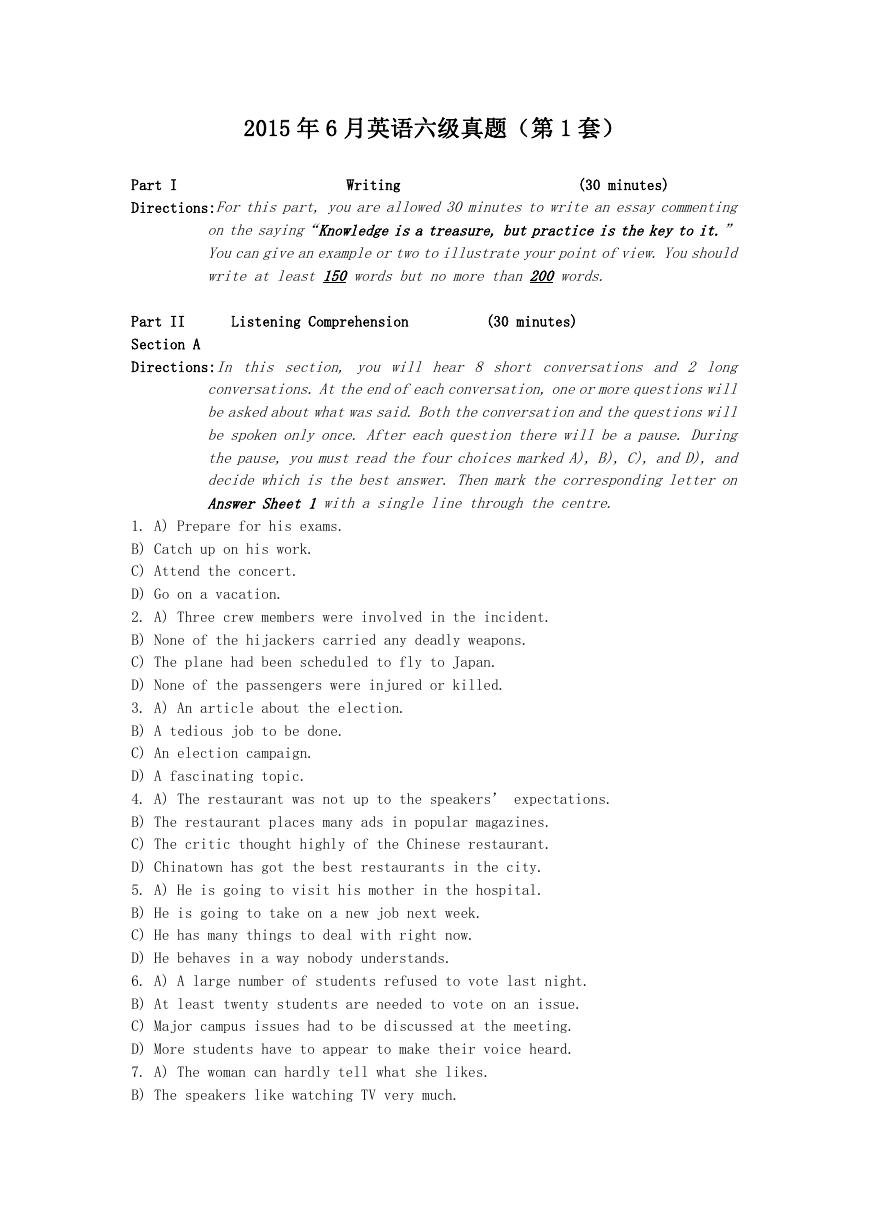
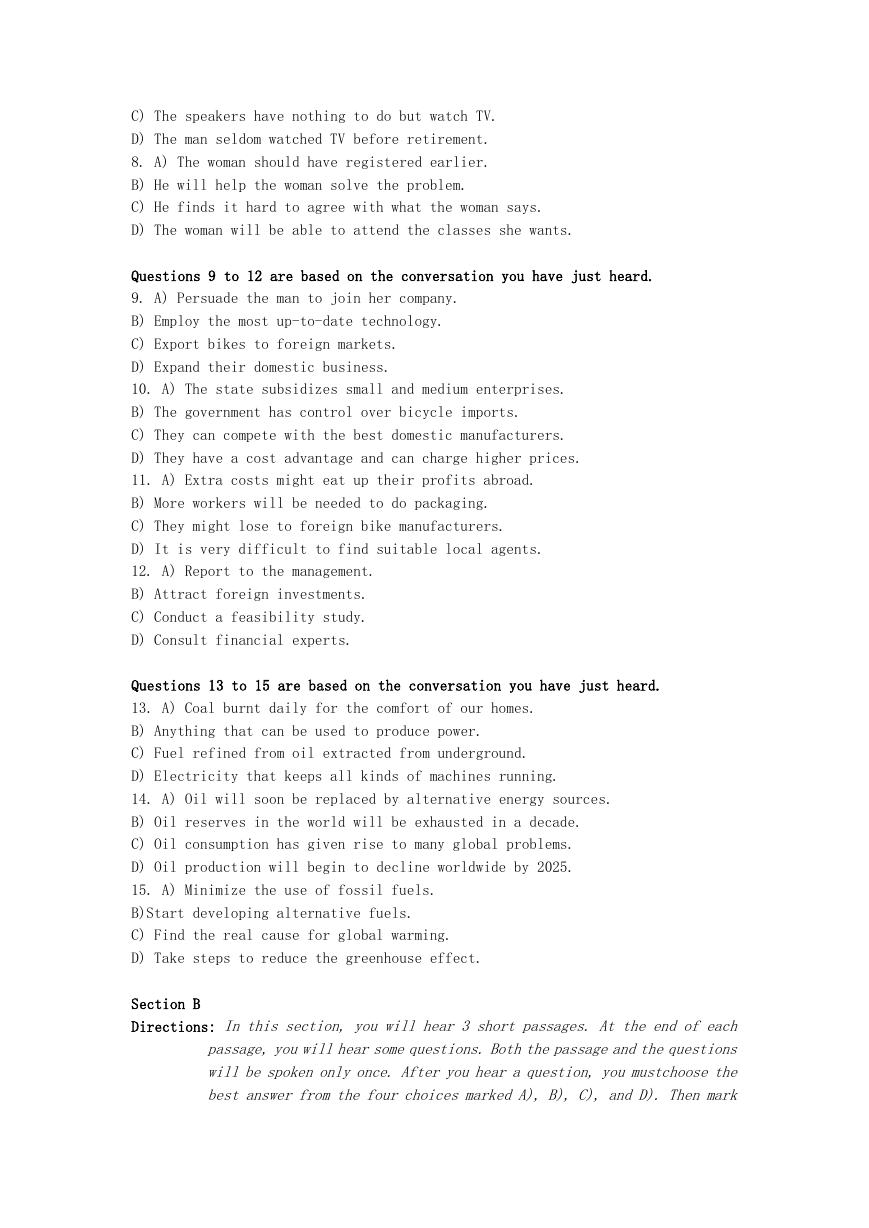
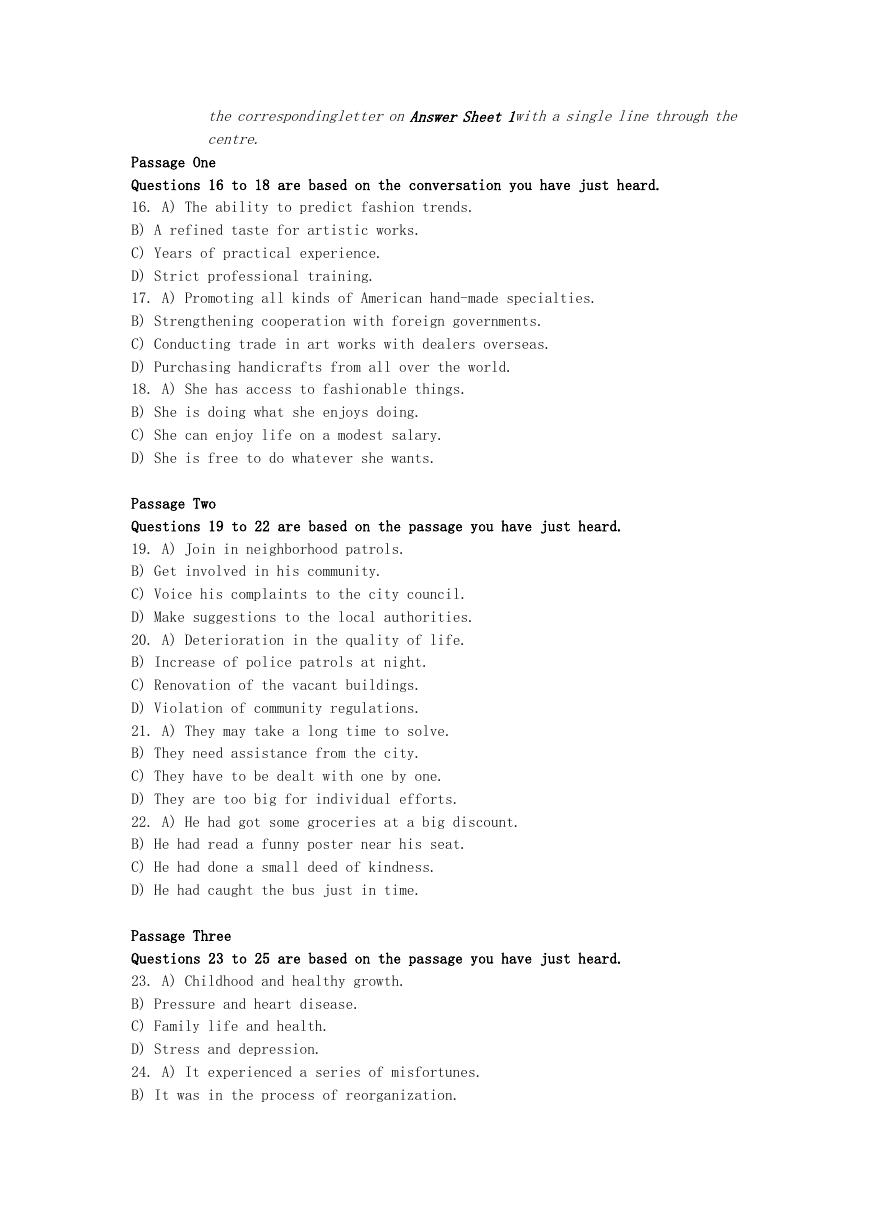
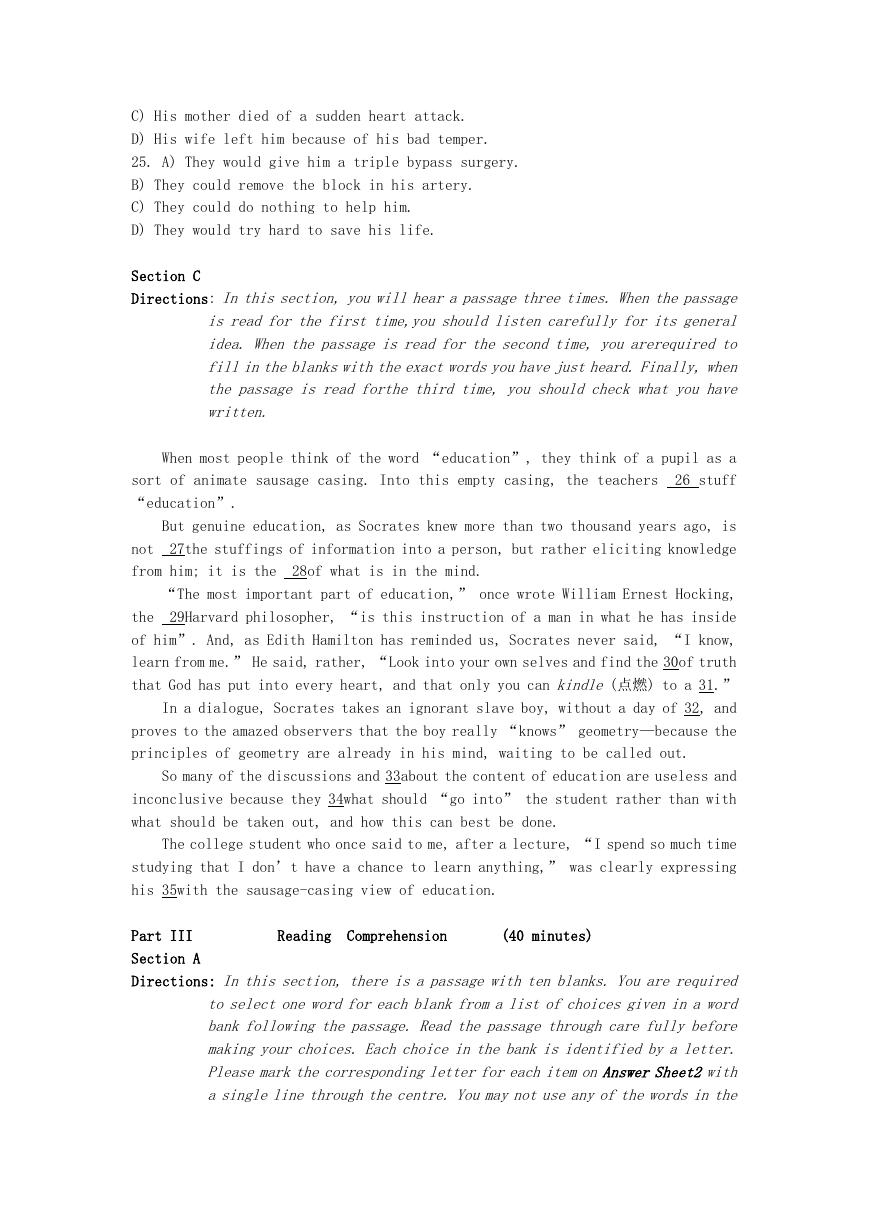
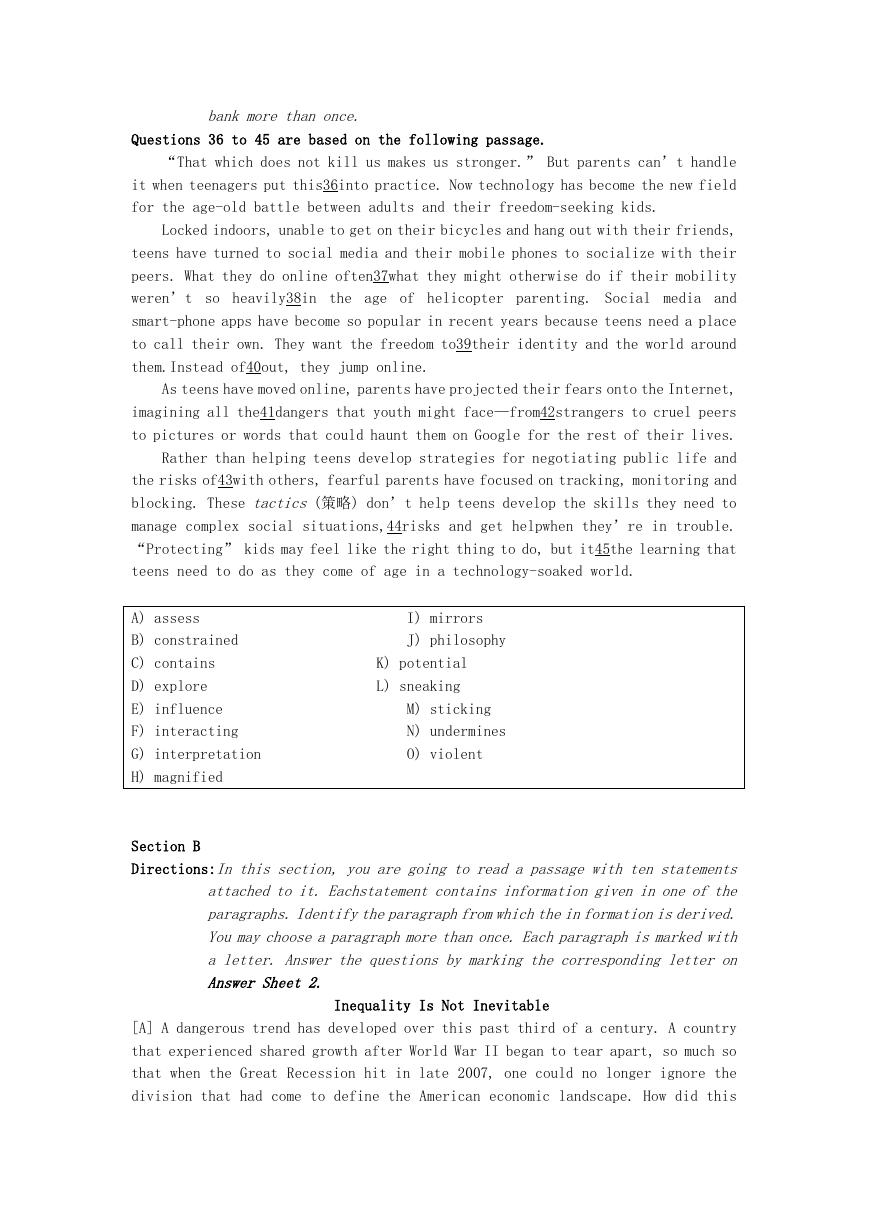
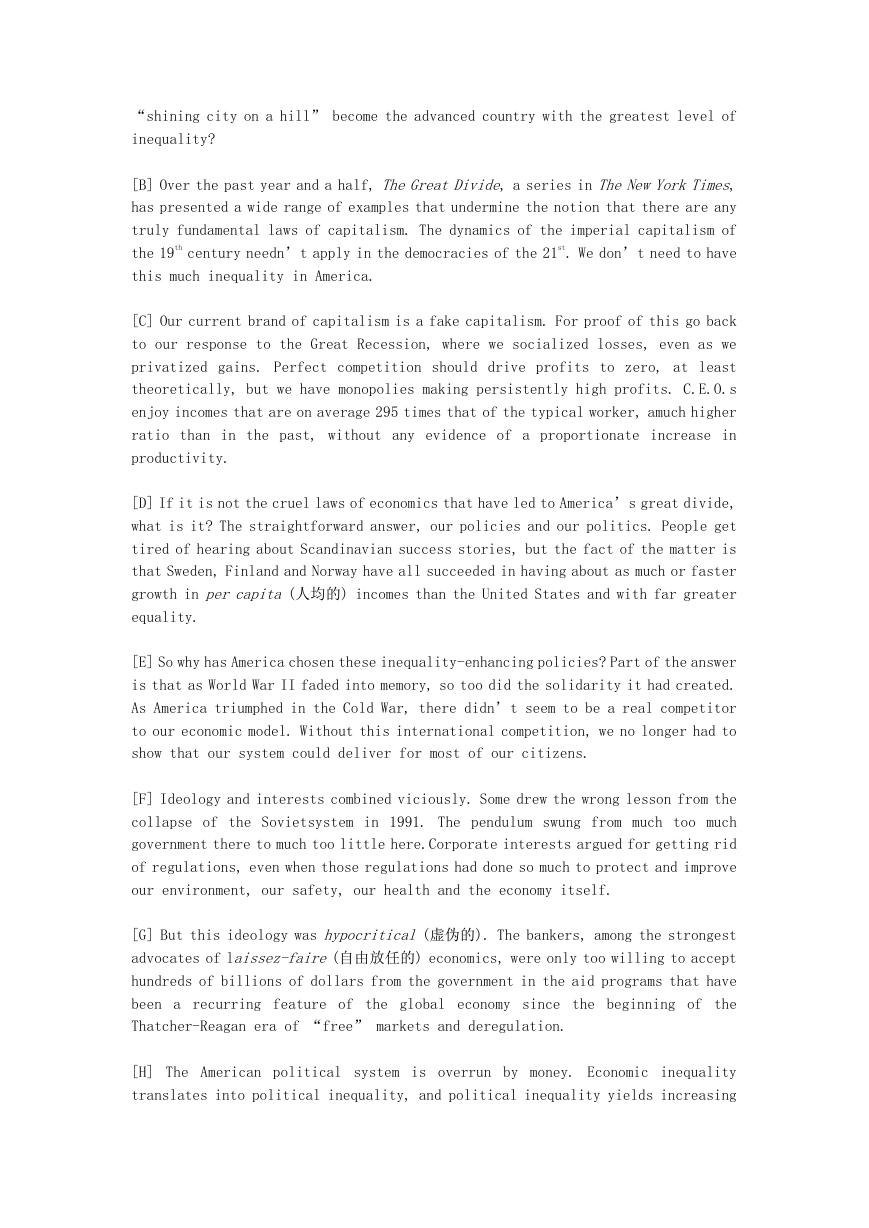
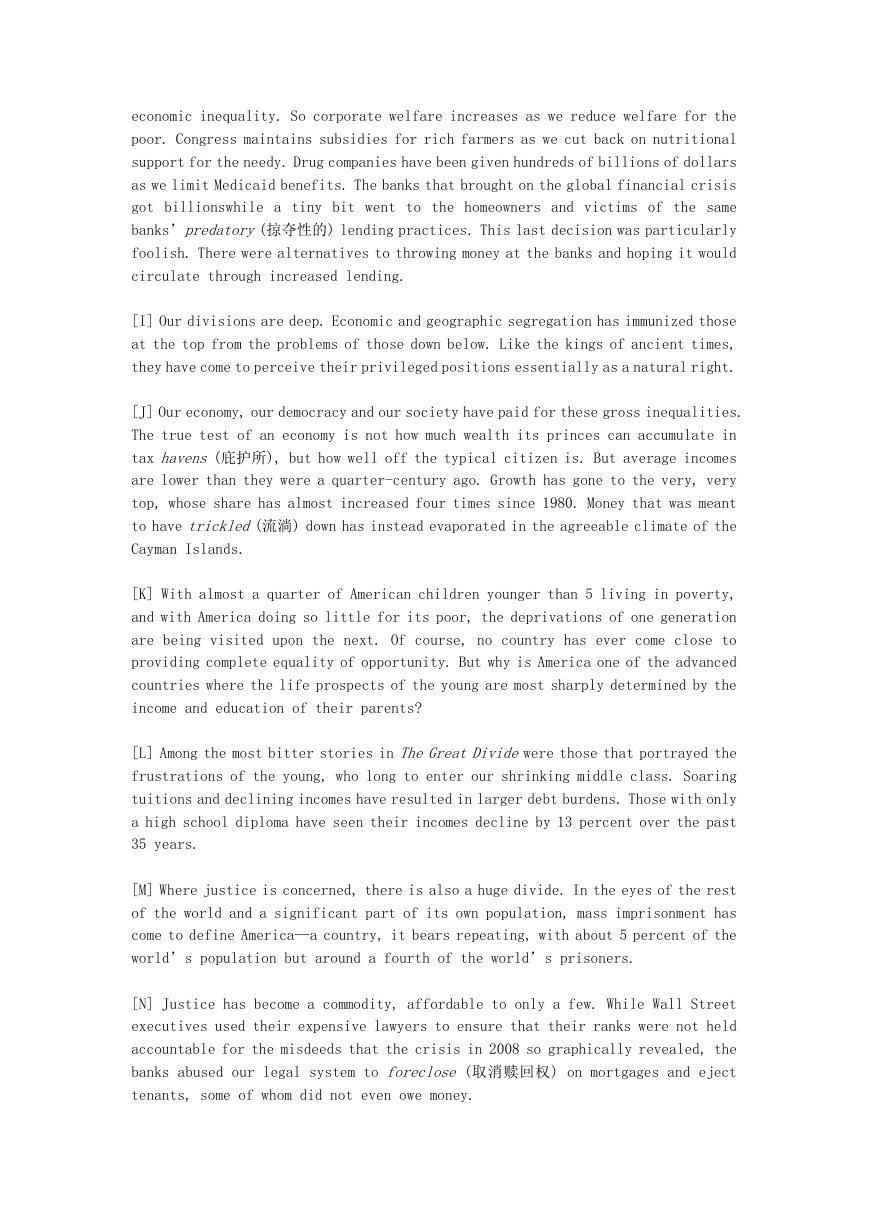
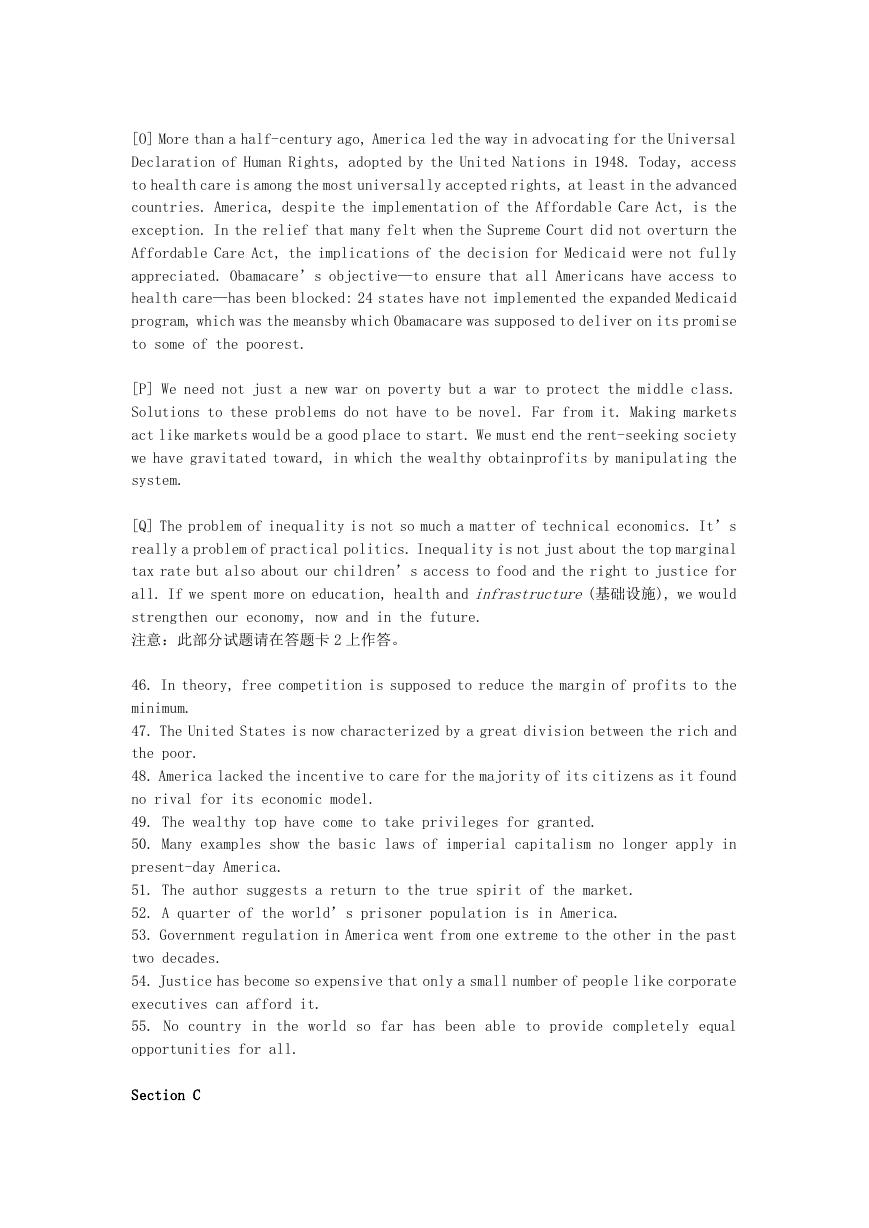








 2023年江西萍乡中考道德与法治真题及答案.doc
2023年江西萍乡中考道德与法治真题及答案.doc 2012年重庆南川中考生物真题及答案.doc
2012年重庆南川中考生物真题及答案.doc 2013年江西师范大学地理学综合及文艺理论基础考研真题.doc
2013年江西师范大学地理学综合及文艺理论基础考研真题.doc 2020年四川甘孜小升初语文真题及答案I卷.doc
2020年四川甘孜小升初语文真题及答案I卷.doc 2020年注册岩土工程师专业基础考试真题及答案.doc
2020年注册岩土工程师专业基础考试真题及答案.doc 2023-2024学年福建省厦门市九年级上学期数学月考试题及答案.doc
2023-2024学年福建省厦门市九年级上学期数学月考试题及答案.doc 2021-2022学年辽宁省沈阳市大东区九年级上学期语文期末试题及答案.doc
2021-2022学年辽宁省沈阳市大东区九年级上学期语文期末试题及答案.doc 2022-2023学年北京东城区初三第一学期物理期末试卷及答案.doc
2022-2023学年北京东城区初三第一学期物理期末试卷及答案.doc 2018上半年江西教师资格初中地理学科知识与教学能力真题及答案.doc
2018上半年江西教师资格初中地理学科知识与教学能力真题及答案.doc 2012年河北国家公务员申论考试真题及答案-省级.doc
2012年河北国家公务员申论考试真题及答案-省级.doc 2020-2021学年江苏省扬州市江都区邵樊片九年级上学期数学第一次质量检测试题及答案.doc
2020-2021学年江苏省扬州市江都区邵樊片九年级上学期数学第一次质量检测试题及答案.doc 2022下半年黑龙江教师资格证中学综合素质真题及答案.doc
2022下半年黑龙江教师资格证中学综合素质真题及答案.doc